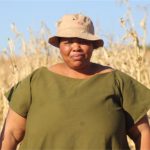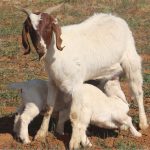
by Olwetu Batyi | Mar 29, 2023 | Uncategorized

Izinini Community Property Association chairperson Dumisani Siyele, DRDAR MEC, Nonkqubela Pieters and Agriculture, Land Reform and Rural Development Minister, Thoko Didiza lift aloft the title deed confirming ownership of 1 282 hectares of land successfully claimed by Izinini community through the land claims process. The CPA uses some of this land for commercial forestry production and sell their logs to SAPPI.

by Olwetu Batyi | Oct 13, 2022 | Uncategorized

MHLONTLO FARMERS SAY NEW SHEARING SHEDS WILL IMPROVE THEIR BUSINESS
SHEEP farmers, who are also wool growers in 10 Tsolo and Qumbu villages said the the shearing sheds handed over by the Eastern Cape MEC for Rural Development and Agrarian Reform, Nonkqubela Pieters, said the new facilities will help improve their businesses as they will now sell pure quality wool using the new structures.
As part of rolling out programmes to grow the province’s agriculture economy, Pieters handed over 10 shearing sheds with shearing equipment with each wool grower’s association getting a structure that comes with a small flock dipping tank, fence and medicine for 3000 sheep.
During the handing over of the shearing sheds, Pieters also handed over 121 rams to local farmers, which will be used to improve genetic condition of local flock owned by local wool growers. She also announced that her department has handed over 36 bulls to farmers in Mhlontlo to improve quality of their herd and increase numbers.
Local farmer and wool grower, Nozipho Tokuzwayo said they were very happy and excited as Mhlontlo farmers with the handing over and opening of these shearing sheds because previously farmers used to shear their sheep in their homes.

“Our wool was contaminated by dirt. We are happy and excited because since the construction of this shearing shed we now have a good structure for shearing and our wool is clean. The rams we got from the government contributed a lot in improving the quality of our wool clip. As a result, we now get better money for our wool because of these rams that give us better quality wool,” said Tokuzwayo.
Her colleague, Mandlovandile Rala said previously when they sheared in their houses they had a problem of poor quality wool but now that they use these sheds they will fetch better money from the markets.
“The shearing shed is where we shear our sheep, get clean wool and even get better money from selling our wool to the markets because of these resources. The other thing is that this develops us because we get new ways to sort our wool according to different parts of the sheep. The rams improve the genetic condition of our flock and give us sheep with improved genetics, great condition and they fetch good money from the markets which improve our businesses,” said Rala.
He added that they are happy with the medicine they got from Pieters because it will improve condition of their sheep because conditioned sheep brings them money through wool and selling it for meat.
Pieters said the Department made this investment in the farmers to assist them to improve their herd, improve quality of their wool clip to be the same quality needed by the markets.

“We invested R10.9 million in the construction of these ten shearing sheds in Mhlontlo alone. When we handover shearing sheds we don’t just give farmers an empty building, we include shearing equipment that farmers need like sorting tables to sort their wool, press it properly so that they stop asking their kids to press it using their feet. Farmers will now weigh their wool so that each person knows how much their wool weighs because the money they get from selling their wool is according to their wool weight and quality,” said Pieters.
She added that Mhlontlo farmers are not only farming with livestock because they also produce crops like grain which her Department also invests in with some farmers getting mechanisation support, others seeds and fertiliser. Ends…

by Olwetu Batyi | Sep 12, 2022 | Uncategorized

PIETERS DELIVERS SHEARING-SHEDS TO EC FARMERS
By Thozi ka Manyisana
GOVERNMENT infrastructure investment in the lucrative wool industry is creating a conducive
environment for communal and emerging farmers to participate meaningfully in one of the
province’s high potential industries that inject much needed income to the economy of the
Eastern Cape.
In pursuit of inclusive economic growth, Department of Rural Development and
Agrarian Reform (DRDAR) MEC Nonkqubela Pieters officially handed over some of the multi
purpose shearing sheds with dipping tanks, animal handling facilities, shearing equipment,
water tanks and ablution facilities to groups of farmers across the province.
In the 2020/21 financial year, DRDAR completed 13 shearing sheds, distributed 584 rams to
communal and emerging farmers of the Eastern Cape as part of its investment in the wool
production businesses of these farmers. A total of 437 farmers exported 4 million kilograms of
wool in the same year.
In the current financial year R22 million is invested in the construction
of 16 shearing sheds, with R15 million injected in the procurement and distribution of sheep and
goats with superior genetics to help improve the quality of the province’s wool clip.
“A lot has been done by the current government because today we see shearing sheds in the
village that can produce the same quality as commercial farmers,” said Pieters during one of the events where she handed keys to excited farmers.
Pieters was told stories by jovial farmers of how the new shearing sheds delivered them from struggles of shearing in rondavels and zinc structures with no shearing equipment. Drdar’s Extension officials are tasked with ensuring that wool grower’s associations don’t sell their wool to informal markets such as bakkies, popularly known as “Boya-Boya” but send their clip to credible companies and buyer BKB.
One of the wool growers benefiting from the Department’s investment is Nkosinathi Nunu, the Chairperson of Ensam Shearing Shed which was with DRDAR’s R900 000 investment. Nunu said: “It has been a long journey in the dark but today is the break of a new dawn. The old shed we built with iron sheets devalued our wool because it. had water leaks and we didn’t have proper equipment to prepare our wool for the market post shearing.”
He believes that with the dip tank that comes with the new shed built by DRDAR, their sheep will be free of diseases like the sheep scab that does not only affect the quality of their wool but also kills their sheep. Jubilant wool growers from Mtyatya village in Calawelcomed the R1.1 million worth multipurpose shearing shed that was handed over to them by Pieters. They said the new multi-purpose shearing shed infrastructure will not only assist them to produce quality wool but will also improve the lives of their flock as it includes a dipping tank. “I would be jumping up and down now if I was still young to show you how happy I am with the delivery of this structure. It has
always been my dream that this shed should be built and finished while I am still alive and able to
see,” said local veteran wool grower, Qiqi Tibisano. As part of ongoing efforts to expand construction of agriculture infrastructure to grow the economy, the DRDAR joined forces with Intsika Yethu local municipality in the construction of the Ncora Flats Shearing Shed. At this shed, DRDAR focused on the drainage system, a dipping tank and the animal handling facility. “As the Eastern Cape government this is the encouragement we need from our farmers, to be initiators (Vukuzenzele) so that we support ambitious people and take them further,” said Pieters during the handover. One of the beneficiaries, Lonwabo Nelani said: ” We have waited for so long for this day, which means the official opening of our factory and our legacy to use. We are grateful for what our fathers left for us and we will always take good care of it”. On other hand, Sibanye Stillwater injected R1,2 million in the construction of the Silulutho Shearing Shed in Ngudle village in Tsomo as part of its community development programme where it develops communities in partnership with government departments like the DRDAR. There are many other shearing sheds in the province that
will be opened and handed over to farmers as and when they are completed by contractors hired by
the DRDAR to build them for farmers.

by Olwetu Batyi | Sep 12, 2022 | Uncategorized

Mazie, veggie farmer encourages women to join agriculture
ZIMASA NTLANGULA, one of the members of Amantonta Agro processing family cooperative in Ntabankulu says she never imagined herself in the agriculture sector.
Excited by the bountiful harvest of their business from production funded by the Department of Rural Development and Agrarian Reform, Ntlangula said when her parents and siblings started their maize production business in the Mvenyane village of Ntabankulu in the Eastern Cape, she did not join them until her love for agriculture was stirred up by the work they put in the business and opportunities created by the enterprise.
Ntlangula said at first she had no interest in the agriculture business but when she looked at the business in the first year and saw its progress, she decided to join forces with her family. “In the early stages of the business there were ups and downs. There were times where I felt like giving up but we realised that our dream will manifest. So this and lack of job opportunities here also attracted me to the business,” said Ntlangula, adding that in their family business every member contributes to the hard work.
As a young woman, Ntlangula said she is happy that women are free to do any work in the country. “When we were growing up our mothers did not have these opportunities. They depended on our fathers but now I feel free because I can do any job I want to do without anyone blocking me and even telling me what to do,” she said.
With their business harvesting 6 tonnes per hectare from 350 hectares of land in Mvenyane, she said: “I am happy that we are harvesting this tonnage because in the beginning this land was fallow.
At first we were not certain we would be able to accomplish what we wanted to do; but now here is our great harvest. It makes us very excited. This harvest shows that we know what we are doing.”
She encourages other women, especially young women to take up opportunities in the agriculture sector, throwing a caveat that agriculture is not an easy business. “It is tough in this business but if you are committed you can do it. Don’t put money first, focus on producing. See what your produce will give you. Don’t put money first, it will come later. You must commit to the agriculture work and have passion for it. I encourage other women to take up agriculture,” said Ntlangula

by Olwetu Batyi | Sep 12, 2022 | Uncategorized

Thobeka’s stud breeding
WITH just two years producing vegetables sold to retail stores nationwide, Thobeka Tebe, 45,now is producing stud breeding of precious sheep and cattle breeds. Tebe is pinning herhopes on the Eastern Cape Department of Rural Development and Agrarian Reform’s support to farmers, in particular the livestock improvement scheme.
Tebe runs a 350ha farm in the GubenxaValley just outside Elliot, 300ha is grazing pastures and she grows crops and livestockfeed on 50ha. She farms South African Merino sheep and Boran cattle breeds that are bothprized for high resilience and survive on lower quality forage than most other breeds.
“I never went to school to study agriculture but it was sheer love for nature and breeding that brought me to the sector. I can attribute my progress to being willing to learn from those who have traversed this road before me and it’s giving handsome returns from crops to livestock, I now want to make a mark on stud breeding,” said Tebe.
According to Tebe, Boran cattle are known for their fertility, early maturation, adaptability to a wide range of climatic conditions, parasites and grow quite old, with cows of fifteen years of age still yielding good quality offspring. With these characteristics she said the breed has a potential to reduce the burden of feed costs to farmers especially in a country that has been gripped by feed shortages due to drought and climatic changes.
“There’s quite a few breeders of Boran in our province and I only know them from East London, Graaff-Reinet and Fort Beaufort, but none of them is a woman. My cattle are also registered with the Boran Society –something which makes me a reliable and recognised breeder,” she added. Following last season’s sale of some of her animals, Tebe is left with 20 cattle – cows, heifers and a single three-year-old bull named Madlabantu and plans to increase her herd.
“If I can get just one more Boran bull and a few heifers I would be fine because Madlabantu is still young and doing his job just well. The other bull would take care of the new heifers. And I depend on a single ram for my flock. I hope the DRDAR comes to my aid with more ewes and rams so
that I can be able to supply even other farmers who want to venture into these low-maintenance yet prized breeds,” she said.
Apart from stud breeding, Tebe sells her livestock to both formal and informal markets in and around the Joe Gqabi District with her wool sold overseas through market agents. Tebe recently relayed her ambitions to the DRDAR MEC Nonkqubela Pieters during her meeting with farmers of the Gubenxa Valley.Pieters advised them to continue applying for support from the department
and ensure that they follow the instructions outlined in the adverts and comply with them.
“The issue with many, not all, is compliance. For instance, Tebe had applied for fencing last year but she didn’t have the required documentation for the lease of the land she is working. Let’s continuously work on compliance and in due time, everyone who is deserving will be assisted because the list is quite long,” said Pieters.
DRDAR has so far assisted Tebe with training towards the South African Good Agricultural
Practices certificate (GAP), potato seeds and advisory support.

by Olwetu Batyi | Sep 12, 2022 | Uncategorized

EC households milk more goats and sheep than cattle, Surveys
More households in the Eastern Cape province milk goats and sheep more than cattle, a survey by
scientists working at the Department of Rural Development and Agrarian Reform’s Dohne. Agriculture Development Institute has found.
Speaking about the results of the survey, one of the scientists, Dr Jean Rust said: “the actual milk
production in litres per household per day in all livestock species across all districts is very low for
cattle and surpassingly popular for goats and sheep.”
For this survey, Rust worked with other scientists, Mr Mabutho Mkhungela and Mr Tinashe Kumburai.
Rust said the availability, manageability, lower maintenance of goats and sheep can potentially
play a role in this regard, adding that though there seemed to be some potential for communal
household milk production, serious development was needed for sustainability. Rust said the survey,
which was conducted between June 2014 and May 2015 was aimed at getting a better understanding of milk production and consumption dynamics in the Eastern Cape province.
A total of 500 households in the five districts of Amathole, Alfred Nzo, Chris Hani, Oliver Tambo and Joe Gqabi drawn from 5 communities per district, 20 households per community and 100 households per district participated in the survey.
“Household characteristics, production system characteristics and production levels are very similar
across the different districts. Members supported by households were surprisingly high,” said Rust. The survey also found that households owning these animals which are miles for their consumption had a good record of arable land allocated to them, however no record of communal grazing land available to each household.
He said the main reason for milking the animals was for their own consumption and the number of animals used per household for milking for consumption are very low, ranging from














